





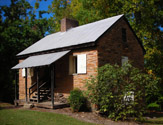









Cotton States Archive
Treasure Amid the Dusty Covers and Musty Pages
When I was around ten or so, my father gave me three old books. They had been given to Dad by Mildred Cox who was handling the estate of Sallie Hoops Moser. Dad had met with Ms. Cox at the nearby Moser farm to look at some old horsedrawn farm implements when he was offered his choice of books from Sallie Moser's well-stocked bookshelves. Encouraged to take as many as he wanted at no charge, Dad hated to "hog them all up" and randomly took only three volumes. I remember him telling me the books were very old, and he advised me to handle them with care. "They might be worth a lot of money one day," he said.
Carefully thumbing through the pages, I took note of their copyright dates and thought, "Wow, these are old as all get-out!" I even read a few of the stories and poems in Southern Prose and Poetry for Schools and enjoyed many of them, but I wound up shelving the books and seldom touched them for the next decade or so. It wasn't until just a few years ago---when I was well into my twenties---that I really came to appreciate what I have. I hate to sound like I've grown up too much, but some old adages and cliches might be true. Your perspective does change with the passing of time, and now my sense of nostalgia and apprecation for history and heritage are stronger than ever. Yes, it's true. I'm starting to sound like an old person!
About the Mosers
To better tell the story regarding these books and the assortment of items I found stuffed inside them, a little background information regarding the Mosers, Sallie in particular, is in order.
Across the road from where I attend church outside of Walhalla, South Carolina is the old Moser farm. While the current occupants of the property have constructed a new home, the original house (though in a state of disrepair) and some outbuildings still stand. Towering above it all is a massive oak tree in the backyard. Especially in the fall and winter, the old oak is visible from my kitchen window about three quarters of a mile away (as the crow flies).
Just simple, practical folks, the Mosers were an interesting couple, by all accounts. Isaac "Ike" Moser (1902-1978) was a farmer and horse trainer. Long-time neighbor, *Milton "Milt" Dickard (b. March 28, 1918), indicates that Lawrence Norton, a local banker and entrepreneur, would acquire "a carload of mules by train from out West, and Ike would break the mules in." He adds that Thurston "Thurst" Jenkins, a black man, lived in a separate dwelling on the Moser farm and assisted Ike with the training of the mules. Noted for utilizing horsepower in the truest sense long after mechanization had become commonplace on most southern farms, Ike stubbornly marched to his own drumbeat. Sallie Hoops Moser (1891-1983) is remembered for her great sense of humor, and her conversations were always filled with laughter. She and Ike grew cotton and corn and, at one point, sold farm fresh milk to Pet Dairy. They churned their own butter, and a sweet potato patch is said to have been a Moser farm fixture every year.
Ike and Sallie married late in life and reportedly had one child who died shortly after birth.
Carefully thumbing through the pages, I took note of their copyright dates and thought, "Wow, these are old as all get-out!" I even read a few of the stories and poems in Southern Prose and Poetry for Schools and enjoyed many of them, but I wound up shelving the books and seldom touched them for the next decade or so. It wasn't until just a few years ago---when I was well into my twenties---that I really came to appreciate what I have. I hate to sound like I've grown up too much, but some old adages and cliches might be true. Your perspective does change with the passing of time, and now my sense of nostalgia and apprecation for history and heritage are stronger than ever. Yes, it's true. I'm starting to sound like an old person!
About the Mosers
To better tell the story regarding these books and the assortment of items I found stuffed inside them, a little background information regarding the Mosers, Sallie in particular, is in order.
Across the road from where I attend church outside of Walhalla, South Carolina is the old Moser farm. While the current occupants of the property have constructed a new home, the original house (though in a state of disrepair) and some outbuildings still stand. Towering above it all is a massive oak tree in the backyard. Especially in the fall and winter, the old oak is visible from my kitchen window about three quarters of a mile away (as the crow flies).
Just simple, practical folks, the Mosers were an interesting couple, by all accounts. Isaac "Ike" Moser (1902-1978) was a farmer and horse trainer. Long-time neighbor, *Milton "Milt" Dickard (b. March 28, 1918), indicates that Lawrence Norton, a local banker and entrepreneur, would acquire "a carload of mules by train from out West, and Ike would break the mules in." He adds that Thurston "Thurst" Jenkins, a black man, lived in a separate dwelling on the Moser farm and assisted Ike with the training of the mules. Noted for utilizing horsepower in the truest sense long after mechanization had become commonplace on most southern farms, Ike stubbornly marched to his own drumbeat. Sallie Hoops Moser (1891-1983) is remembered for her great sense of humor, and her conversations were always filled with laughter. She and Ike grew cotton and corn and, at one point, sold farm fresh milk to Pet Dairy. They churned their own butter, and a sweet potato patch is said to have been a Moser farm fixture every year.
Ike and Sallie married late in life and reportedly had one child who died shortly after birth.
Sallie Hoops Moser was the daughter of John E. and Emma Gossett Hoops, both of whom are buried at the Richland Presybterian Church less than five miles away from the Moser farm. Having outlived Mr. Hoops, Emma married John Thomas Davis in 1910. My friend Barbara Martin, Milt Dickard's daughter, shared with me some obituary information regarding Sallie Moser's mother. An article published in the Tugaloo Tribune on July 31, 1934 indicated that Mrs. Davis's death had come on the heels of her second husband's passing. In sharp contrast to newspaper reportage today, the Tugaloo Tribune stated:
Mrs. Davis was a woman whose kindness and liberality knew no bounds as her neighbors and acquaintances can testify. She was industrious, not only as to household duties, but was active about whatever there was to do on the farm. Truly she had labored long and well and was ready for the rest and the reward that awaits all who have been faithful through tribulation.
Describing Mrs. Davis as "a member of the Antioch Methodist Church in Pickens County since girlhood," the article went on to say that she was survived by her daughter, Miss Sallie Hoops, and two stepchildren.
Mrs. Davis was a woman whose kindness and liberality knew no bounds as her neighbors and acquaintances can testify. She was industrious, not only as to household duties, but was active about whatever there was to do on the farm. Truly she had labored long and well and was ready for the rest and the reward that awaits all who have been faithful through tribulation.
Describing Mrs. Davis as "a member of the Antioch Methodist Church in Pickens County since girlhood," the article went on to say that she was survived by her daughter, Miss Sallie Hoops, and two stepchildren.
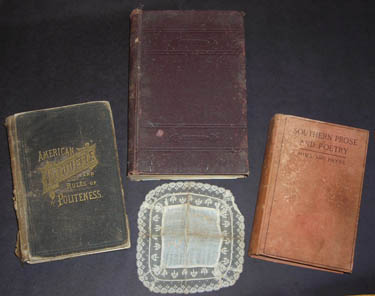
From the estate of Sallie Hoops Moser (1891-1983), these books and the interesting items accompanying them were given to me as a boy. My appreciation for these treasures, unfortunately, did not come until later in life. Thankfully, I held on to the books all of those years.
The books are: American Etiquette and Rules of Politeness (Chicago: Rand, McNally & Company, 1883); Special Report on Diseases of the Horse (Washington: United States Department of Agriculture/Government Printing Office, 1907); and Southern Prose and Poetry for Schools (New York: Charles Scribner's Sons, 1910). Pictured in the lower middle is either a delicate, lacy doily or handkerchief. It was found folded and placed inside Southern Prose and Poetry for Schools.
The books are: American Etiquette and Rules of Politeness (Chicago: Rand, McNally & Company, 1883); Special Report on Diseases of the Horse (Washington: United States Department of Agriculture/Government Printing Office, 1907); and Southern Prose and Poetry for Schools (New York: Charles Scribner's Sons, 1910). Pictured in the lower middle is either a delicate, lacy doily or handkerchief. It was found folded and placed inside Southern Prose and Poetry for Schools.
This obituary brings up a couple of important points. First of all, in those days, small southern papers did not have frequent violent crimes, important court cases and political scandals on which to daily report. The death of an upstanding member of the community was newsworthy and most certainly merited an article. Sadly, it is not uncommon for today's newspapers to charge bereaved families a few hundred dollars just to publish a brief obituary---one that seldom provides more than the when and where of a loved one's funeral services. The second revelation of this article was the marital status of Mrs. Davis's surviving daughter. Sallie was obviously still single when her mother passed. By the standards of that day, she had probably already been labeled an old maid at 43 years of age!
Some 50 years later when her estate was being dissolved, an observation of Sallie Moser's library would indicate that a love for reading had been instilled in her. She might have been influenced by one or both of her parents or perhaps a teacher. Regardless, these books in my possession show more than age and discoloration. Their wear reflects a great deal of use, and one could reasonably speculate that Sallie had spent many an evening by a kerosene lamp absorbing the useful (and sometimes useless!) knowledge and imaginative tales great books can afford. She lived through three of our nation's toughest trials---World War I, the Great Depression and World War II. Being immersed in the thick of a plot and seeing fictional characters brought to life in one's imagination was likely a profound stress relief during times when endurance and survival were foremost on the minds of most Americans.
The Books:
American Etiquette and Rules of Politeness
At 124 years of age, this book is the oldest of the three. It is rather amusing to read. While some of the advice given is still practical in the twenty-first century, the biggest part of the book is archaic. Chapters are devoted to everything from personal hygeine to how to dress during times of mourning. Particularly humorous are the sections "Assisting a Lady to Mount" and "Requirements for a Happy Marriage." In my sarcasm, I would have recommended standing behind a gal with a straight pin! She would have gotten on that horse---gracefully or clumsily---whether he had been fitted English or Western or with a side saddle. And let's just say that the 1883 version of how to create a happy marriage probably wouldn't go over too well among the editors or readers of Redbook, O, The Oprah Magazine, Esquire or GQ. A final interesting aspect of American Etiquette and Rules of Politeness is the fact that it was authored by Walter R. Houghton, James K. Beck, James A. Woodburn, Horage R. Hoffman, A. B. Philputt, A. E. Davis and Mrs. W. R. Houghton---six men and only one woman! Could this mean that the stringent, stuffy attitudes of proper societies from times past were dictated mostly by men? Never mind!
Special Report on Diseases of the Horse
Sallie Hoops Moser was a capable farmer, and the care of livestock most certainly would not have been foreign to her, but her husband, Ike, was the horseman. Arguably, this book belonged to him, and it is only natural that Special Report on Diseases of the Horse would have been on the shelf with these other volumes when Sallie passed away. Published by the United States Department of Agriculture, I can attest, as a horse owner, that this century-old book contains much relevant advice and information in spite of modern-day advances in the treatment of equine ailments and diseases.
Southern Prose and Poetry for Schools
A collection of novel excerpts, short stories, poems and letters, Southern Prose and Poetry for Schools was compiled by Edwin Mims and Bruce R. Payne, professors from the Universities of North Carolina and Virginia respectively. Published in 1910 by Charles Scribner's Sons of New York, the book includes "The New South," a famous speech by former Atlanta Constitution managing editor Henry Grady; "Song of the Chattahoochee," a work by noted Georgia poet Sidney Lanier; "Free Joe and the Rest of the World," a story by Joel Chandler Harris (author of the Uncle Remus folktales); letters by Robert E. Lee and Thomas Jefferson; and poems by Edgar Allan Poe (who was stationed in Charleston during his stint in the army).
Some 50 years later when her estate was being dissolved, an observation of Sallie Moser's library would indicate that a love for reading had been instilled in her. She might have been influenced by one or both of her parents or perhaps a teacher. Regardless, these books in my possession show more than age and discoloration. Their wear reflects a great deal of use, and one could reasonably speculate that Sallie had spent many an evening by a kerosene lamp absorbing the useful (and sometimes useless!) knowledge and imaginative tales great books can afford. She lived through three of our nation's toughest trials---World War I, the Great Depression and World War II. Being immersed in the thick of a plot and seeing fictional characters brought to life in one's imagination was likely a profound stress relief during times when endurance and survival were foremost on the minds of most Americans.
The Books:
American Etiquette and Rules of Politeness
At 124 years of age, this book is the oldest of the three. It is rather amusing to read. While some of the advice given is still practical in the twenty-first century, the biggest part of the book is archaic. Chapters are devoted to everything from personal hygeine to how to dress during times of mourning. Particularly humorous are the sections "Assisting a Lady to Mount" and "Requirements for a Happy Marriage." In my sarcasm, I would have recommended standing behind a gal with a straight pin! She would have gotten on that horse---gracefully or clumsily---whether he had been fitted English or Western or with a side saddle. And let's just say that the 1883 version of how to create a happy marriage probably wouldn't go over too well among the editors or readers of Redbook, O, The Oprah Magazine, Esquire or GQ. A final interesting aspect of American Etiquette and Rules of Politeness is the fact that it was authored by Walter R. Houghton, James K. Beck, James A. Woodburn, Horage R. Hoffman, A. B. Philputt, A. E. Davis and Mrs. W. R. Houghton---six men and only one woman! Could this mean that the stringent, stuffy attitudes of proper societies from times past were dictated mostly by men? Never mind!
Special Report on Diseases of the Horse
Sallie Hoops Moser was a capable farmer, and the care of livestock most certainly would not have been foreign to her, but her husband, Ike, was the horseman. Arguably, this book belonged to him, and it is only natural that Special Report on Diseases of the Horse would have been on the shelf with these other volumes when Sallie passed away. Published by the United States Department of Agriculture, I can attest, as a horse owner, that this century-old book contains much relevant advice and information in spite of modern-day advances in the treatment of equine ailments and diseases.
Southern Prose and Poetry for Schools
A collection of novel excerpts, short stories, poems and letters, Southern Prose and Poetry for Schools was compiled by Edwin Mims and Bruce R. Payne, professors from the Universities of North Carolina and Virginia respectively. Published in 1910 by Charles Scribner's Sons of New York, the book includes "The New South," a famous speech by former Atlanta Constitution managing editor Henry Grady; "Song of the Chattahoochee," a work by noted Georgia poet Sidney Lanier; "Free Joe and the Rest of the World," a story by Joel Chandler Harris (author of the Uncle Remus folktales); letters by Robert E. Lee and Thomas Jefferson; and poems by Edgar Allan Poe (who was stationed in Charleston during his stint in the army).
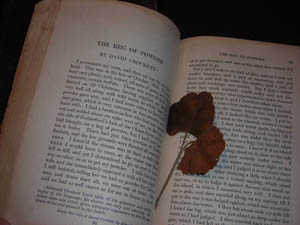
"The Capture of Five Scotchmen"
My favorite entry in the book is novelist John Pendleton Kennedy's "The Capture of Five Scotchmen." Actually an excerpt from Horse-Shoe Robinson: A Tale of the Tory Ascendancy in South Carolina (New York: George P. Putnam, 1852), this story recounts the adventures of Horseshoe Robinson (a character inspired by Major James Galbreath Robertson, whose former residence still stands near Westminster, South Carolina---just minutes from my home!) and Andy Ramsay (the freckled teen Robinson recruited to help track down five riotous, chicken-stealing Scotchmen).
My favorite entry in the book is novelist John Pendleton Kennedy's "The Capture of Five Scotchmen." Actually an excerpt from Horse-Shoe Robinson: A Tale of the Tory Ascendancy in South Carolina (New York: George P. Putnam, 1852), this story recounts the adventures of Horseshoe Robinson (a character inspired by Major James Galbreath Robertson, whose former residence still stands near Westminster, South Carolina---just minutes from my home!) and Andy Ramsay (the freckled teen Robinson recruited to help track down five riotous, chicken-stealing Scotchmen).
These pressed clover leaves mark the beginning of David Crockett's "The Keg of Powder" in Southern Prose and Poetry for Schools.
Children, especially boys, need at least one positive male role model who epitomizes masculinity, strength, heroism and integrity, and usually these traits do not need to be exhibited in magnified proportions to effectively impact a young person. Kennedy's elaborate description of Horseshoe Robinson might sound a little hyperbolic by modern standards, but Robinson was portrayed as the kind of figure any young fellow would want to emulate, and I'll bet this story was an exciting read for scores of school-age boys in its day. Kennedy writes:
Galbraith Robinson was a man of altogether rougher mould. Nature had carved out, in his person, an athlete whom the sculptors might have studied to improve the Hercules. Every lineament of his body indicated strength. His stature was rather above six feet; his chest broad; his limbs sinewy, and remarkable for their symmetry. There seemed to be no useless flesh upon his frame to soften the prominent surface of his muscles; and his ample thigh, as he sat upon horseback, showed the working texture at each step, as if part of the animal on which he rode. His was one of those iron forms that might be imagined almost bullet-proof. With all these advantages of person, there was a radiant, broad, good nature upon his face; and the glance of a large, clear, blue eye told of arch thoughts, and of shrewd, homely wisdom. A ruddy complexion accorded well with his sprightly but massive features, of which the prevailing expression was such as silently invited friendship and trust. If to these traits be added an abundant shock of yellow, curly hair, terminating in a luxuriant queue, confined by a narrow strand of leather cord, my reader will have a tolerably correct idea of the person I wish to describe.
Galbraith Robinson was a man of altogether rougher mould. Nature had carved out, in his person, an athlete whom the sculptors might have studied to improve the Hercules. Every lineament of his body indicated strength. His stature was rather above six feet; his chest broad; his limbs sinewy, and remarkable for their symmetry. There seemed to be no useless flesh upon his frame to soften the prominent surface of his muscles; and his ample thigh, as he sat upon horseback, showed the working texture at each step, as if part of the animal on which he rode. His was one of those iron forms that might be imagined almost bullet-proof. With all these advantages of person, there was a radiant, broad, good nature upon his face; and the glance of a large, clear, blue eye told of arch thoughts, and of shrewd, homely wisdom. A ruddy complexion accorded well with his sprightly but massive features, of which the prevailing expression was such as silently invited friendship and trust. If to these traits be added an abundant shock of yellow, curly hair, terminating in a luxuriant queue, confined by a narrow strand of leather cord, my reader will have a tolerably correct idea of the person I wish to describe.
In this coming-of-age tale of sorts, the heroes are clearly defined and good triumphs over evil. Andy Ramsay aids Robinson in apprehending the Scotchmen and, upon returning the boy to his mother, Robinson proudly announces, ". . . I have brought home a young soldier that is worth his weight in gold." As the boy's mother embraces him and praises his bravery, she inquires, "Did he behave handsomely, Mr. Robinson? But I am sure he did."
"A little more venturesome, ma'am, than I wanted him to be," replied Horseshoe; "but he did excellent service. These are his prisoners, Mistress Ramsay; I should never have got them if it hadn't been for Andy. In these drumming and fifing times the babies suck in quarrel with their mother's milk. Show me another boy in America that's made more prisoners than there was men to fight with, that's all!"
"A little more venturesome, ma'am, than I wanted him to be," replied Horseshoe; "but he did excellent service. These are his prisoners, Mistress Ramsay; I should never have got them if it hadn't been for Andy. In these drumming and fifing times the babies suck in quarrel with their mother's milk. Show me another boy in America that's made more prisoners than there was men to fight with, that's all!"
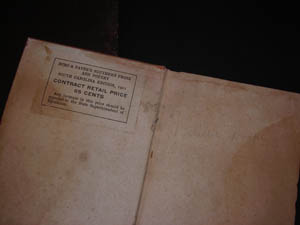
Affixed on the inside cover of Southern Prose and Poetry for Schools is a sticker indicating a "Contract Retail Price" of 65 cents. The opposite page has been handsigned in pencil by Sallie Hoops.
"Free Joe and the Rest of the World"
Another great story in Southern Prose and Poetry for Schools is Joel Chandler Harris's poignant "Free Joe and the Rest of the World," an excerpt from Free Joe and Other Georgian Sketches (New York: Charles Scribner's Sons, 1887). In this story set in the antebellum South, the plight of the main character, ironically enough, is not slavery. To the contrary, Joe is a free man, but he experiences oppression of a different kind. The intense scrutiny of him by a distrusting white society, whose supposed supremacy is blatantly evident, is fueled by the sincere ignorance and host of insecurities that are at the root of all bigotry and prejudice.
In describing Free Joe, Harris states:
The problems of one generation are the paradoxes of a succeeding one, particularly if war, or some such incident, intervenes to clarify the atmosphere and strengthen the understanding. Thus, in 1850, Free Joe represented not only a problem of large concern, but, in the watchful eyes of Hillsborough, he was the embodiment of that vague and mysterious danger that seemed to be forever lurking on the outskirts of slavery, ready to sound a shrill and ghostly signal in the impenetrable swamps, and steal forth under the midnight stars to murder, rapine, and pillage,---a danger always threatening, and yet never assuming shape; intangible, and yet real; impossible, and yet not improbable. Across the serene and smiling front of safety, the pale outlines of the awful shadow of insurrection sometimes fell. With this invisible panorama as background, it was natural that the figure of Free Joe, simple and humble as it was, should assume undue proportions. Go where he would, do what he might, he could not escape the finger of observation and the kindling eye of suspicion. His lightest words were noted, his slightest actions marked.
Other Items:
Another great story in Southern Prose and Poetry for Schools is Joel Chandler Harris's poignant "Free Joe and the Rest of the World," an excerpt from Free Joe and Other Georgian Sketches (New York: Charles Scribner's Sons, 1887). In this story set in the antebellum South, the plight of the main character, ironically enough, is not slavery. To the contrary, Joe is a free man, but he experiences oppression of a different kind. The intense scrutiny of him by a distrusting white society, whose supposed supremacy is blatantly evident, is fueled by the sincere ignorance and host of insecurities that are at the root of all bigotry and prejudice.
In describing Free Joe, Harris states:
The problems of one generation are the paradoxes of a succeeding one, particularly if war, or some such incident, intervenes to clarify the atmosphere and strengthen the understanding. Thus, in 1850, Free Joe represented not only a problem of large concern, but, in the watchful eyes of Hillsborough, he was the embodiment of that vague and mysterious danger that seemed to be forever lurking on the outskirts of slavery, ready to sound a shrill and ghostly signal in the impenetrable swamps, and steal forth under the midnight stars to murder, rapine, and pillage,---a danger always threatening, and yet never assuming shape; intangible, and yet real; impossible, and yet not improbable. Across the serene and smiling front of safety, the pale outlines of the awful shadow of insurrection sometimes fell. With this invisible panorama as background, it was natural that the figure of Free Joe, simple and humble as it was, should assume undue proportions. Go where he would, do what he might, he could not escape the finger of observation and the kindling eye of suspicion. His lightest words were noted, his slightest actions marked.
Other Items:
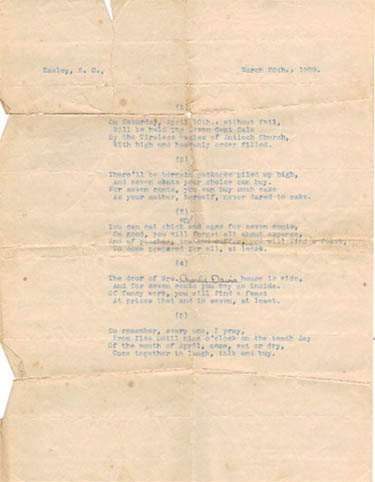
March 28, 1909
Easley, S.C.On Saturday, April 10., without fail, Will be held the Seven Cent Sale, By the Tireless Ladies of Antioch Church, With high and heavenly order filled.
There'll be bargain packages piled up high, And seven cents your choice can buy, For seven cents, you can buy such cake As your mother, herself, never dared to make.
You can eat chicken and eggs for seven cents, So good, you will forget all about expense, And of peaches, tea and coffee, you will find a feast, So come prepared for all, at least.
The door of Mrs. Charlie Davis house is wide, And for seven cents you may go inside. Of fancy work, you will find a feast At prices that end in seven, at least.
So remember, everyone, I pray, From five until nine o'clock on the tenth day, Of the month of April, come, wet or dry, Come together to laugh, talk and buy.
Seven Cent Sale
This crafty, century-old poem, promoting a church fundraiser, was found folded and tucked within the pages of Southern Prose and Poetry for Schools. Let's just say that seven cents bought quite a bit in 1909! Today seven cents doesn't even pay the retail sales tax on a $1.oo purchase in many states.The Antioch Church mentioned in the poem was the same church of which Sallie Moser's mother had been a life-long member.
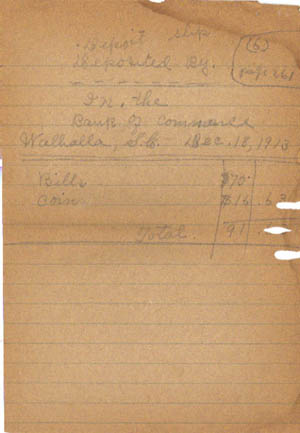
Handwritten Notes
In addition to the poem regarding the seven cent sale and aforementioned lacy handkerchief, other items discovered between the covers of these books include several pieces of paper (now brown and brittle with age) on which notes, bank records and even a recipe have been penciled.
One page, dated December 18, 1913, details a $91.63 deposit made at the Bank of Commerce in Walhalla, South Carolina. Another records a presumed real estate transaction with Charles Raymond in the amount of $1,757.50.
Oddly, the last page of interest features a list of song titles: "Blind Child," "Charlie Brooks [and Nellie Adair]," "[Little] Brown Jug," "Snow Flakes," "Going Over the Sea," "Off To the Bar Room He Goes," "I'm Nobody's Darling [on Earth]," "Swanee River" (presumably referencing the Stephen Foster classic titled "Old Folks at Home" in actuality) and the heart-wrenching "In the Baggage Coach Ahead." Below the list of titles are the lyric lines, "I'm nobody's darling on earth....Nobody cares for me," from the folk song "I'm Nobody's Darling on Earth," a traditional bluegrass tune made popular by the Stanley Brothers. Scribbled on the reverse of this paper is an incomplete biscuit recipe!
In addition to the poem regarding the seven cent sale and aforementioned lacy handkerchief, other items discovered between the covers of these books include several pieces of paper (now brown and brittle with age) on which notes, bank records and even a recipe have been penciled.
One page, dated December 18, 1913, details a $91.63 deposit made at the Bank of Commerce in Walhalla, South Carolina. Another records a presumed real estate transaction with Charles Raymond in the amount of $1,757.50.
Oddly, the last page of interest features a list of song titles: "Blind Child," "Charlie Brooks [and Nellie Adair]," "[Little] Brown Jug," "Snow Flakes," "Going Over the Sea," "Off To the Bar Room He Goes," "I'm Nobody's Darling [on Earth]," "Swanee River" (presumably referencing the Stephen Foster classic titled "Old Folks at Home" in actuality) and the heart-wrenching "In the Baggage Coach Ahead." Below the list of titles are the lyric lines, "I'm nobody's darling on earth....Nobody cares for me," from the folk song "I'm Nobody's Darling on Earth," a traditional bluegrass tune made popular by the Stanley Brothers. Scribbled on the reverse of this paper is an incomplete biscuit recipe!
This handwritten note records the details of a December 18, 1913 deposit made, presumably by Sallie Hoops, at the Bank of Commerce in Walhalla, South Carolina.
The diverse list of songs might indicate that Sallie Hoops Moser, an organist, was just as well-rounded musically as she was well-read.
One Man's Junk, Another Man's Treasure
Many would consider these books and their loose contents little more than garage sale material and, indeed, their monetary value can't be all that significant. However, I see these items as fascinating artifacts made even more interesting by an accompanying story that only I can tell. And that's reason enough to hold on to them.
One Man's Junk, Another Man's Treasure
Many would consider these books and their loose contents little more than garage sale material and, indeed, their monetary value can't be all that significant. However, I see these items as fascinating artifacts made even more interesting by an accompanying story that only I can tell. And that's reason enough to hold on to them.
BIBLIOGRAPHY
Walter R. Houghton, James K. Beck, James A. Woodburn, Horage R. Hoffman, A. B. Philputt, A. E. Davis and Mrs. W. R. Houghton, American Etiquette and Rules of Politeness (Chicago: Rand, McNally & Company, 1883).
John Tasker Howard, A Treasury of Stephen Foster (New York: Random House, Inc., 1946).
Edwin Mims and Bruce R. Payne, Southern Prose and Poetry for Schools (New York: Charles Scribner's Sons, 1910).
Doctors Pearson, Michener, Law, Harbaugh, Trumbower, Liautard, Holcombe, Huidekoper, Stiles, Mohler and Adams, Special Report on Diseases of the Horse (Washington: United States Department of Agriculture/Government Printing Office, 1907).
"Mrs. Emma Davis Dies, Resident Walhalla Rt. 1," Tugaloo Tribune, July 31, 1934.
"Obituaries: Isaac 'Ike' Moser," Keowee Courier, June 21, 1978.
"Obituaries: Sallie Hoops Moser," Keowee Courier, July 13, 1983.
OTHER SOURCES
*Conversation with Milton "Milt" Dickard, Walhalla, South Carolina, Spring 2007. (Mr. Dickard, 89 at the time this story was originally published, passed away on December 8, 2012.)
Visit to Richland Presbyterian Church cemetery, Westminster, South Carolina, Spring 2007.
Walter R. Houghton, James K. Beck, James A. Woodburn, Horage R. Hoffman, A. B. Philputt, A. E. Davis and Mrs. W. R. Houghton, American Etiquette and Rules of Politeness (Chicago: Rand, McNally & Company, 1883).
John Tasker Howard, A Treasury of Stephen Foster (New York: Random House, Inc., 1946).
Edwin Mims and Bruce R. Payne, Southern Prose and Poetry for Schools (New York: Charles Scribner's Sons, 1910).
Doctors Pearson, Michener, Law, Harbaugh, Trumbower, Liautard, Holcombe, Huidekoper, Stiles, Mohler and Adams, Special Report on Diseases of the Horse (Washington: United States Department of Agriculture/Government Printing Office, 1907).
"Mrs. Emma Davis Dies, Resident Walhalla Rt. 1," Tugaloo Tribune, July 31, 1934.
"Obituaries: Isaac 'Ike' Moser," Keowee Courier, June 21, 1978.
"Obituaries: Sallie Hoops Moser," Keowee Courier, July 13, 1983.
OTHER SOURCES
*Conversation with Milton "Milt" Dickard, Walhalla, South Carolina, Spring 2007. (Mr. Dickard, 89 at the time this story was originally published, passed away on December 8, 2012.)
Visit to Richland Presbyterian Church cemetery, Westminster, South Carolina, Spring 2007.
Author: Greg Freeman. Published September 26, 2007.
Copyright
Southern Edition
All Rights Reserved
Southern Edition
All Rights Reserved
All materials contained on this site, including text and images, are protected by copyright laws and may not be reproduced without prior written permission from the publisher. Where applicable, use of some items contained on this site may require permission from other copyright owners.
Fair Use of text from SouthernEdition.com is permitted to the extent allowed by copyright law. Proper citation is requested. Please use this guide when citing a Southern Edition article.
Contact Greg Freeman or SouthernEdition.comFair Use of text from SouthernEdition.com is permitted to the extent allowed by copyright law. Proper citation is requested. Please use this guide when citing a Southern Edition article.